Creative Industries Initiative For Africa (CIIFA) and the Creative Talent Foundation presents
MUSIC BUSINESS ACADEMY FOR AFRICA
A platform dedicated to training and developing an informed and empowered workforce for Africa’s Entertainment Industry
The MBA For Africa curriculum has been developed in collaboration with Prof. Carlos Chirinos of the NYU Music Business Programme.
SUPPORTED BY


MODULE ONE
Introduction to Music Business in Africa
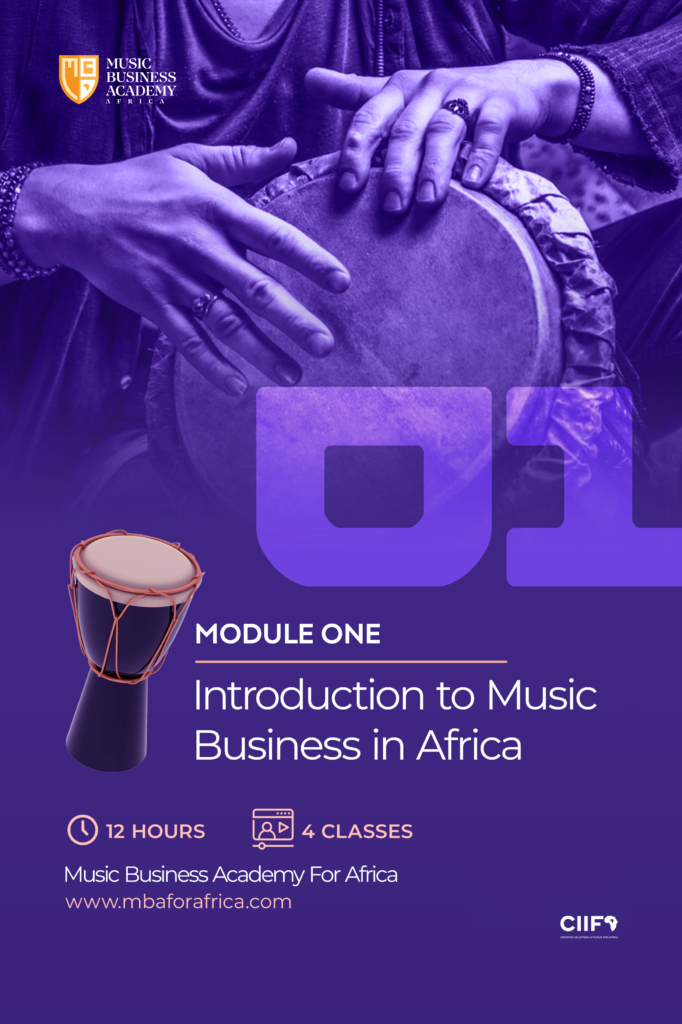
Class 1: African Music Industry History
- Learn about opportunities that attracted majors to Africa in the 70s and 80s.
- Understand elements that led to the growth of the music industry in the 90s and 2000s.
- Understand the roles of current stakeholders in the future of the African Music industry.
Class 2: Music and The African Economy
- Understanding how other sectors of the economy interact with the music and creative industries.
- Gain knowledge of challenges hindering the growth of the music industry in Africa.
- Identifying opportunities for growth and development in Africa’s music industry.
Class 3: Entrepreneurship in the Music Industry.
- Understanding of company structure and starting a company.
- Identifying core roles needed in a company in the short and long term.
Class 4: Finance basics for Music Business.
- Understanding basic bookkeeping.
- Basic understanding of resource management (financial, human).
- Knowledge of tax management basics for Africa
MODULE TWO
Industries of the Music Business
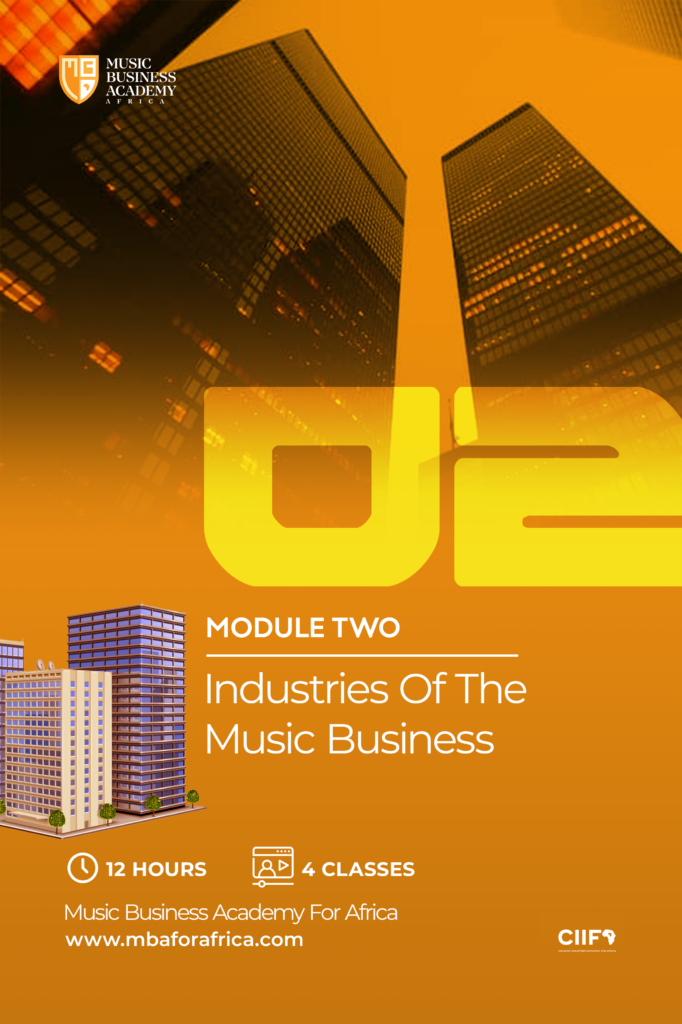
Class 1: The Publishing Industry (Royalty Collection and Distribution)
- Knowledge of the difference between Composition and Sound recording.
- Role of publishers, PRO’s and composers.
- Royalty collection for Performance rights: TV, Radio, Online.
Class 2: The Recording Industry
- Master Recordings
- Labels promotional strategies: singles, albums, collaborations.
- Digital distribution of sound recordings.
Class 3: The Live Music Industry
- Learn about concert promoters, agents and venues
- Understand concert production essentials (live music contracts)
- Learn about Logistics, ticket selling revenue, securing an international agent, starting a booking agency.
Class 4: The Interactive Industry (Syncs, Placements and Opportunities in the Digital Industry)
- The basics of synchronisation to film and TV, commercials etc.
- Digital interactive: video games, VR,AR
Class 5: Support Services (Legal Services, Marketing & PR, and Accountancy) in the Music Industry
- Describe the roles and functions of various support services in the music industry.
- Understand how support services contribute to the success of musicians and music companies.
- Demonstrate an understanding of the relationship between support services and career goals in the music industry.
MODULE THREE
Management and A&R/Music Development
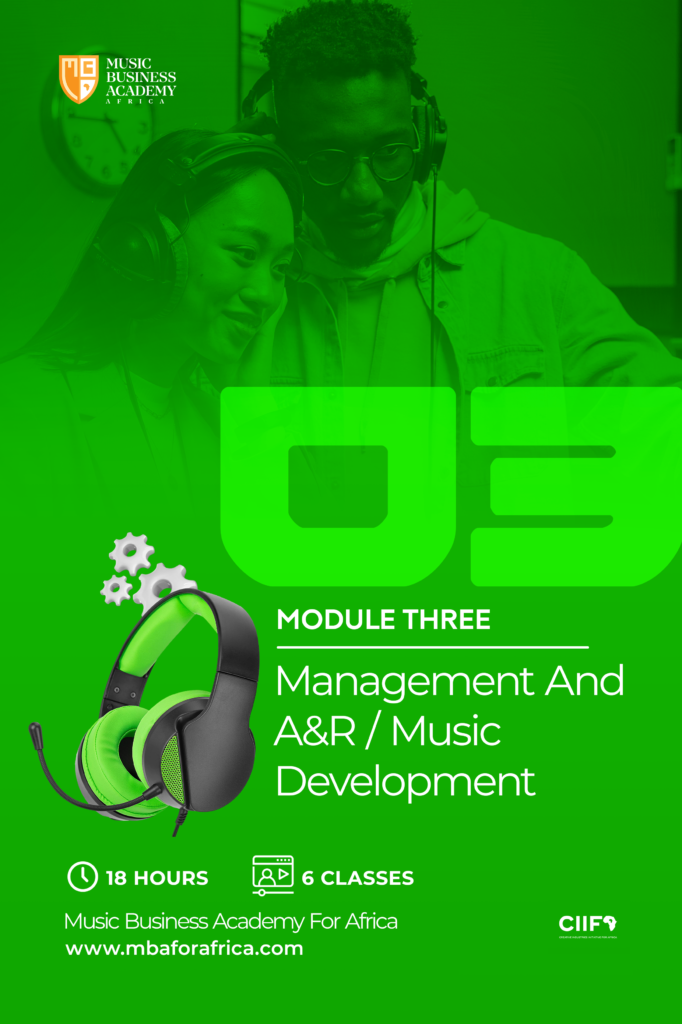
Class 1: Artist Management
- Understanding of the roles of managers and management.
- Understanding of the skills and traits required for talent management.
- Learn about conflict of interests and how they can adversely affect the artist-manager relationship.
- Introduction to contracts for managers.
Class 2: Tools and Platforms for Recording Artists.
- Understanding revenue generating processes and mechanics on music platforms based on region and other factors.
Class 3: Managers and A&Rs as Stakeholders In Talent Development.
- Understanding the role of an A&R
- Ability to highlight revenue opportunities for A&R practitioners in the industry.
- Knowledge of the A&R process and players involved.
Class 4: Talent Discovery, Assessment and Development
- Understanding of the artist development process.
- Learning how to assess discovered talent.
- The Artist’s Life Cycle.
Class 5: Artist Planning
- Knowledge of elements in an artist’s plan and business plan.
- Marketing activities for each stage of the artist’s growth using the Artist life cycle
Class 6: Artistic Identity and Establishment of a Core Audience
- Identify important elements of audience and fan engagement for conversions.
- Knowledge about how to create an identity for the talent.
- How to use social media and existing digital platforms to establish a core audience.
MODULE FOUR
Intellectual Property and Contracts
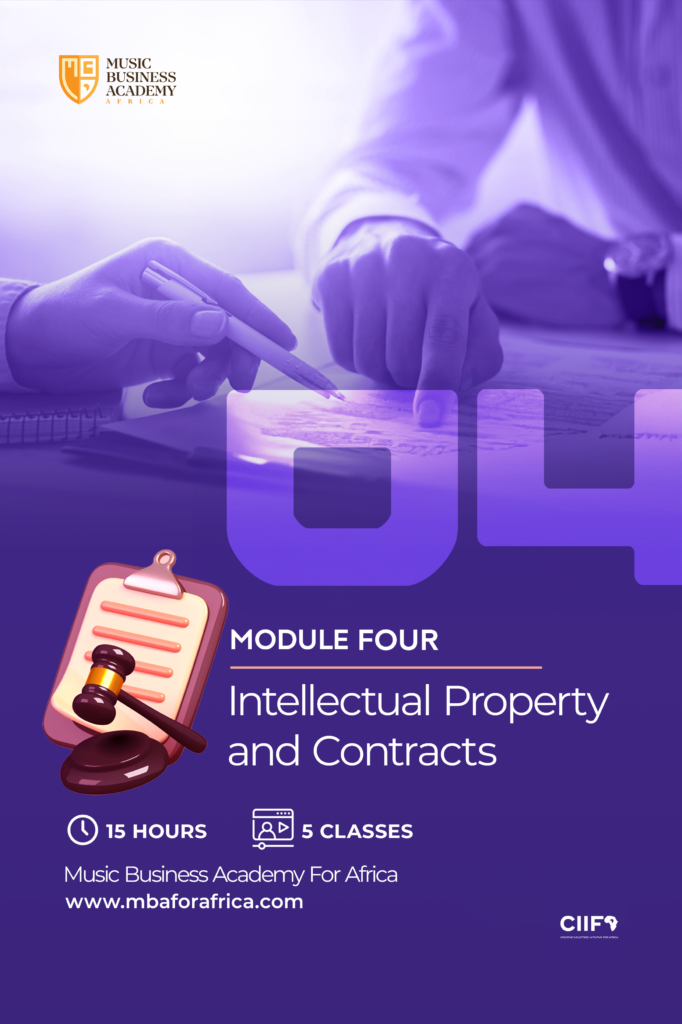
Class 1: Tools for Composers
- Learn about platforms used for revenue collection for composers.
- Learn about how to work with publishers and PROs/CMOs as a songwriter.
Class 2: Copyrights
- Learn how to protect copyright in Africa.
- Understanding the role of rights owners in the governance of CMOs and PROs.
- Knowledge of revenue streams in sound recording and composition.
Class 3: Music Industry Contracts I (Management and Label Contracts)
- Understanding the role of Management and Managers.
- Learning to propose managerial advice for artists.
- Defining and differentiating the roles of managers and labels using contracts.
Class 4: Music Industry Contracts II (Endorsements, Performances, Sponsorships)
- Understanding contract terms and clauses, their meanings and consequences of defaulting.
- Learning contract drafting and negotiation.
Class 5: IP Valuation (Trademarks, Patents, and Monesting IP)
- Understanding of how the industry protects and monitises IP.
- Knowledge of considerations that shape IP laws.
MODULE FIVE
Music
Production
101
(OPTIONAL)
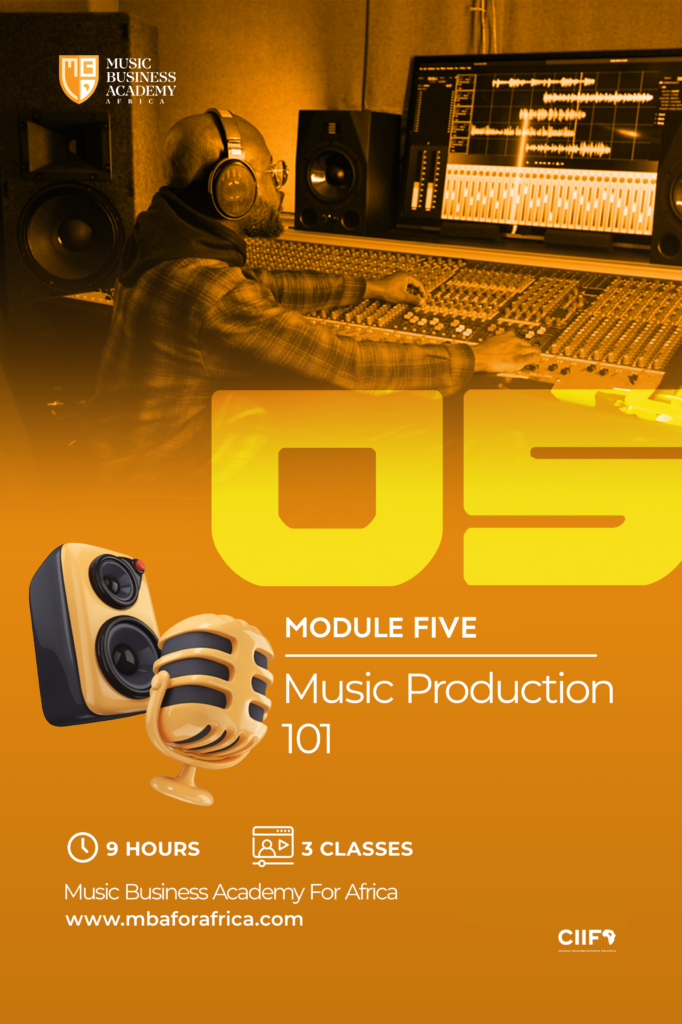
Class 1: Music Creation (Writing and Production)
- Learn about useful tools for writing and producing music.
- Learn about the processes involved in songwriting & structuring a song.
- Learn the importance of split sheets for composers.
- Revenue streams for composers.
Class 2: Music Recording
- Learn about recording basics and practises for recording artists.
- Recording Etiquettes.
Class 3: Mixing and Mastering in Music
- Learn how to record and send music for mixing and mastering.
- The difference between Mixing and Mastering and the importance of each of them.
- How to find and work with the right mixing and mastering engineer for you.
- Mixing and Mastering for streaming and for performances.
MODULE SIX
Branding & Marketing in the Music Business.
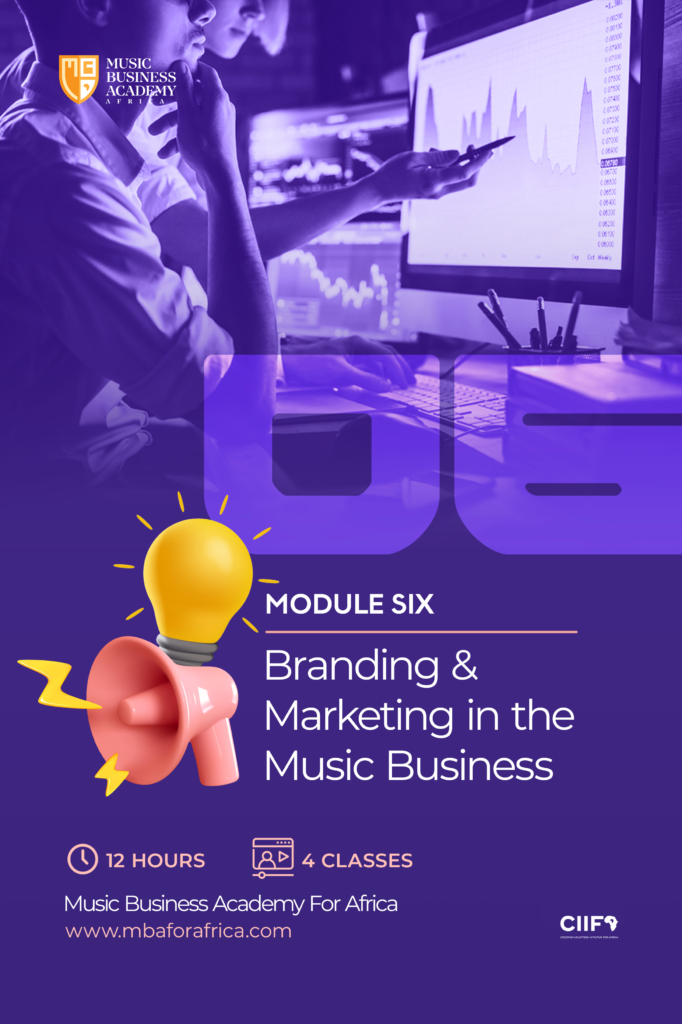
Class 1: Music Distribution
- Learn about local and international platforms.
- Music planning and Music submission for artists
- The importance and functions of Music Aggregators and DIY platforms.
Class 2: Music and Brand Marketing
- Building an artist brand.
- Learn about Public relations and its importance
- Understanding the basics of music marketing and relevant marketing concepts.
- Understanding the role of decision making in music marketing.
Class 3: Music Marketing Strategy
- Learn how to develop marketing objectives for artist’s music and brand
- Learn how to evaluate marketing projects in line with strategic or business plan.
Class 4: Social media and Digital Marketing in Music Business
- Understanding how to use social media as a marketing tool.
- Data Collection through social media.
- The importance and practical use of Digital Marketing (Social Media Ads, Email Marketing, Newsletters) in Music and Brand Marketing.
MODULE SEVEN
Events and Touring in Africa
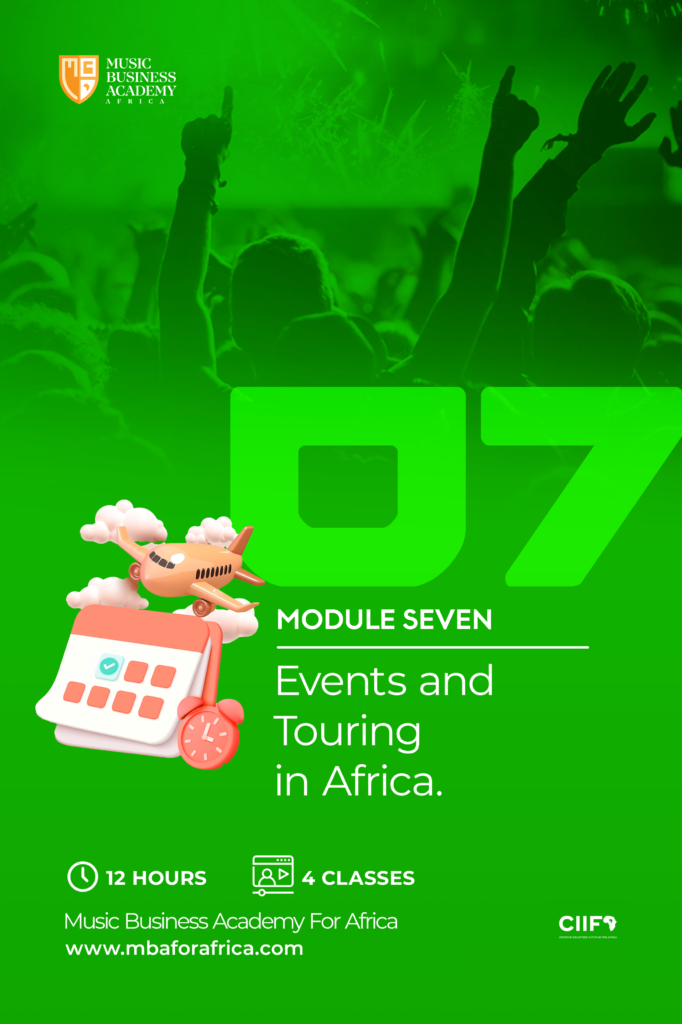
Class 1: Event Planning and Management
- Demonstrate ability to design and plan events.
- Define factors contributing to a successful show.
- Identity and avoid factors that contribute to unsuccessful events.
Class 2: Live Events Practise
- Understanding of Management events (Operations, Bookings, Promotions Agency
- Produce a real life event.
- Learning how to budget for and pitch events.
Class 3: Touring in Africa
- Identify challenge and opportunities concerning touring in Africa
- Understand of Investment opportunities concerning touring in Africa
- Identifying investment challenges and solutions
Class 4: Revenue Streams in Touring
- Understanding of merchandising and cross-marketing using event
- Fan clubs and fun engagement through Live events.
MODULE EIGHT
Project Management
In Music
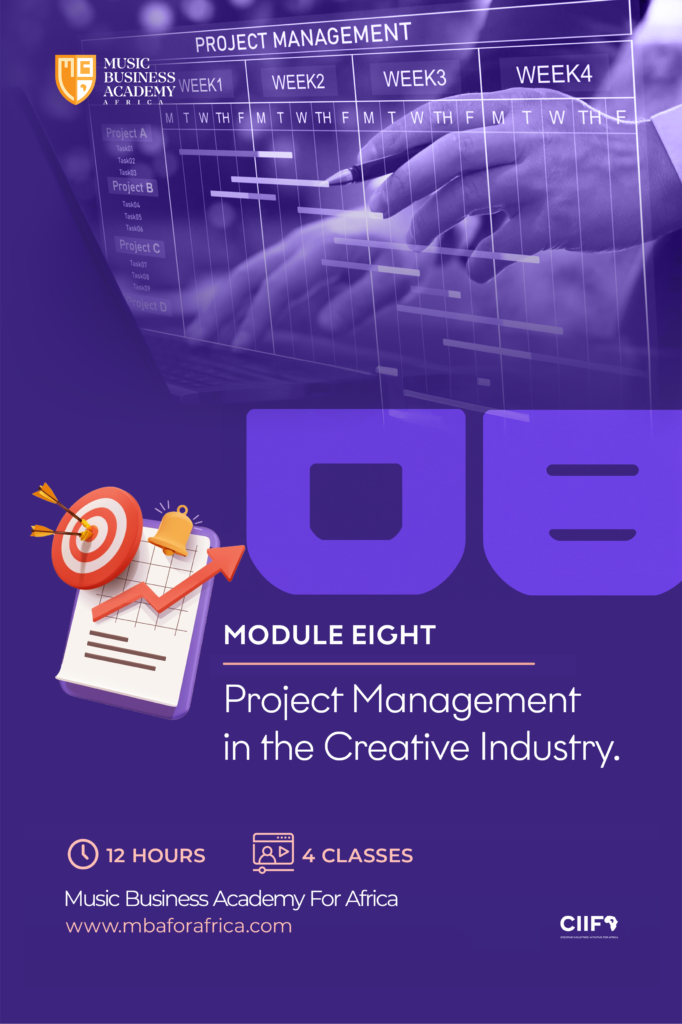
Class 1: Project Management Foundations for Creatives and Defining Project Success & Scope.
- Understanding project management fundamentals
- Understanding the difference between traditional and creative project management
- Overview of the creative industry landscape
- Identifying stakeholders and managing client expectations
- Developing creative briefs and SMART goals
- Creating realistic and achievable project scopes
- Risk assessment and mitigation in creative projects
Class 2: Building Timelines and Budgets & Agile Methodologies for Creative Teams.
- Breaking down creative work into manageable tasks
- Accurate work estimation for creative teams
- Building a project budget with both hard and soft costs
- Using project management tools (Gantt charts, Kanban boards, etc.)
- Benefits of Agile in Creative Projects
- Adapting Scrum and Kanban to creative workflows
- Managing iterations and handling changing scope
Class 3: Collaboration, Team Leadership, Monitoring, Feedback, and Project Refinement
- Developing clear communication strategies within creative teams
- Motivating and managing creative talent
- Resolving conflicts and fostering productive collaboration
- Setting project KPIs to measure progress
- Gathering and utilising client feedback
- Adapting the project plan based on data
- The art of the pivot: knowing when to make adjustments
Class 4: Project Completion and Post-Project Analysis
- Effective project handoff and documentation
- Conducting retrospectives to optimise future projects
- Building strong client relationships for repeat business
A platform dedicated to training and developing an informed and empowered workforce for Africa’s Entertainment Industry.
People…Information…Opportunities
ADDRESS
CIIFA Limited,
4B1, Onikoyi Lane, Parkview Estate, Ikoyi, Lagos, Nigeria
CONTACT
+234 817 256 0000
